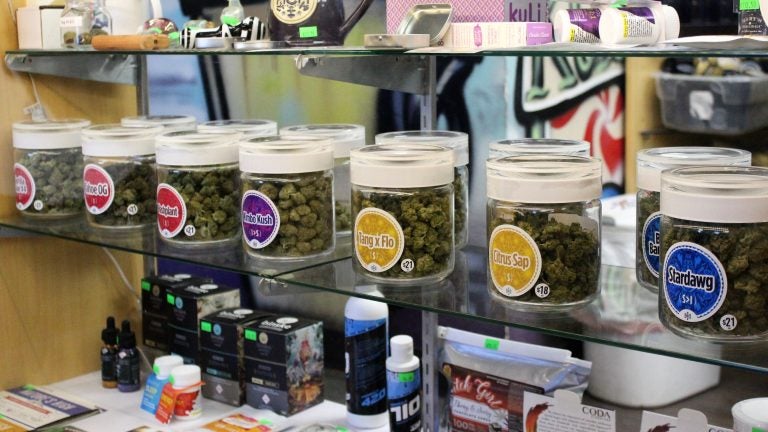Delaware lawmakers introduce marijuana legalization bill
Less than a year after the Delaware General Assembly could not muster enough support to legalize recreational marijuana, legislators are resurrecting the effort.

Like an old fashioned candy store varieties of marijuana are display in jars. (Bill Barlow/for WHYY)
Less than a year after the Delaware General Assembly could not muster enough support to legalize recreational marijuana, legislators are resurrecting the effort.
Sponsors of the new legislation, introduced Thursday, said their bill is stronger than last year’s because it challenges the black market by setting an affordable tax rate at the point of sale; allows outdoor cultivation; and establishes a system to monitor the black market.
“We want to create a legal industry that’s going to pay good jobs with good wages and benefits,” said prime sponsor state Rep. Ed Osienski, D-Brookside. “This would create an industry that will give back to the state. Whereas now, any revenue from the illegal market is going to cartels that are more likely funding other illegal activities.”
In June of last year, a measure to legalize recreational marijuana, sponsored by then-state Rep. Helene Keeley, failed in Delaware’s House of Representatives by four votes.
Osienski’s legislation would allow adults 21 and older to purchase up to 1 ounce of marijuana from a licensed retail marijuana store.
Similar to last year’s legislation, the measure would continue to ban driving under the influence; prohibit individuals from growing their own marijuana, permit employers to have zero-tolerance policies and drug test, and limit marijuana use to private settings.
Renters would be allowed to use or possess marijuana at their residence. However, some private property owners could set prohibitions at, for instance, university dorms and long-term care facilities.
Echoing Keeley’s legislation, Osienski’s bill also would set packaging requirements to keep products out of the hands of children.
Revisions to previous measure
However, the new legislation establishes a lower point-of-sale tax — 15% — and aims to ensure prices are competitive in order to keep the black market at bay. The legislation doesn’t specify a selling price, and the new sponsors say they cannot predict how much revenue it will generate for the state. Any revenue would be go to the state’s general fund, which the General Assembly spends as it wishes.
The new legislation also would direct the Division of Alcohol and Tobacco Enforcement to create an Office of Marijuana Control Commission within the Department of Safety and Homeland Security. The bill’s sponsors believe this will save money by utilizing law enforcement officers who are already trained.
The commissioner would enforce regulations, how many stores can be established and where.
Within 16 months of enactment, the legislation calls for an open licensing application process for 15 retailers. If demand were to increase, the commissioner could create applications for additional licenses.
The legislation sets forth mandatory spacing between stores and municipalities and unincorporated areas, and local municipalities would have the power to prohibit marijuana operations within their borders. The location of stores would depend on demand, local control and licensing by the commissioner, according to the bill’s sponsors.
The commissioner also would reward applicants who promise living wages, employer-paid health insurance and other benefits, and those who hire a diverse workforce. The new measure also allows medical marijuana centers to sell small amounts of recreational marijuana.
The records of individuals with prior marijuana-related offenses would be eligible for expungement, as long as they have no violent felony convictions.
Proponents of marijuana legalization say it has medical benefits, creates jobs and boosts the economy. They argue criminalizing marijuana creates a dangerous illicit market and causes unnecessary arrests of nonviolent offenders, often with a racial bias.
Opponents make their case
However, marijuana legalization still has strong opposition. Lawmakers who voted against legalization last year pointed to too many unanswered safety and regulatory issues.
Addiction support groups, several police associations, as well as AAA, are concerned about health, public safety and impaired driving.
In a Thursday statement, AAA said marijuana poses a threat to road safety and authorities don’t have the necessary tools to measure impairment.
“AAA strongly advocates for the safety of drivers, passengers, and pedestrians by opposing House Bill 110,” said Cathy Rossi, vice president of Public and Government Affairs for AAA Mid-Atlantic. “We have more data now than we did two years ago showing that crashes related to marijuana use increase after a state legalizes recreational marijuana. More drivers will drive high, not fully knowing the risks of using marijuana before getting behind the wheel. This puts everyone on the road at greater risk.”
The bill’s sponsors contend police do have tools and resources to determine if a driver is impaired.
“The way we’re treating marijuana is tougher than how we’re treating alcohol,” said the bill’s co-sponsor state Sen. Trey Paradee, D-Dover. “Currently in Delaware you can have an open container of alcohol in the car, but this bill will prohibit any access to the product to anyone in the vehicle.”
Throughout his campaign, Gov. John Carney said he wasn’t on board with legalization. Carney hasn’t said if he would veto a bill if it landed on his desk. However, in February of last year he said he was opposed.
“I just don’t think we ought to be a leader there,” Carney said then. “Again, as we’re trying to strengthen our workforce, create an environment where companies can be successful to make Delaware stronger, I don’t think that will do it.”
While the sponsors say it is the right time to legalize marijuana, the bill may not be set for a vote until next year.
“We’re in no hurry to push this this through,” Osienski said. “We’re going to be taking the time to listen to our constituents and colleagues.”
WHYY is your source for fact-based, in-depth journalism and information. As a nonprofit organization, we rely on financial support from readers like you. Please give today.





